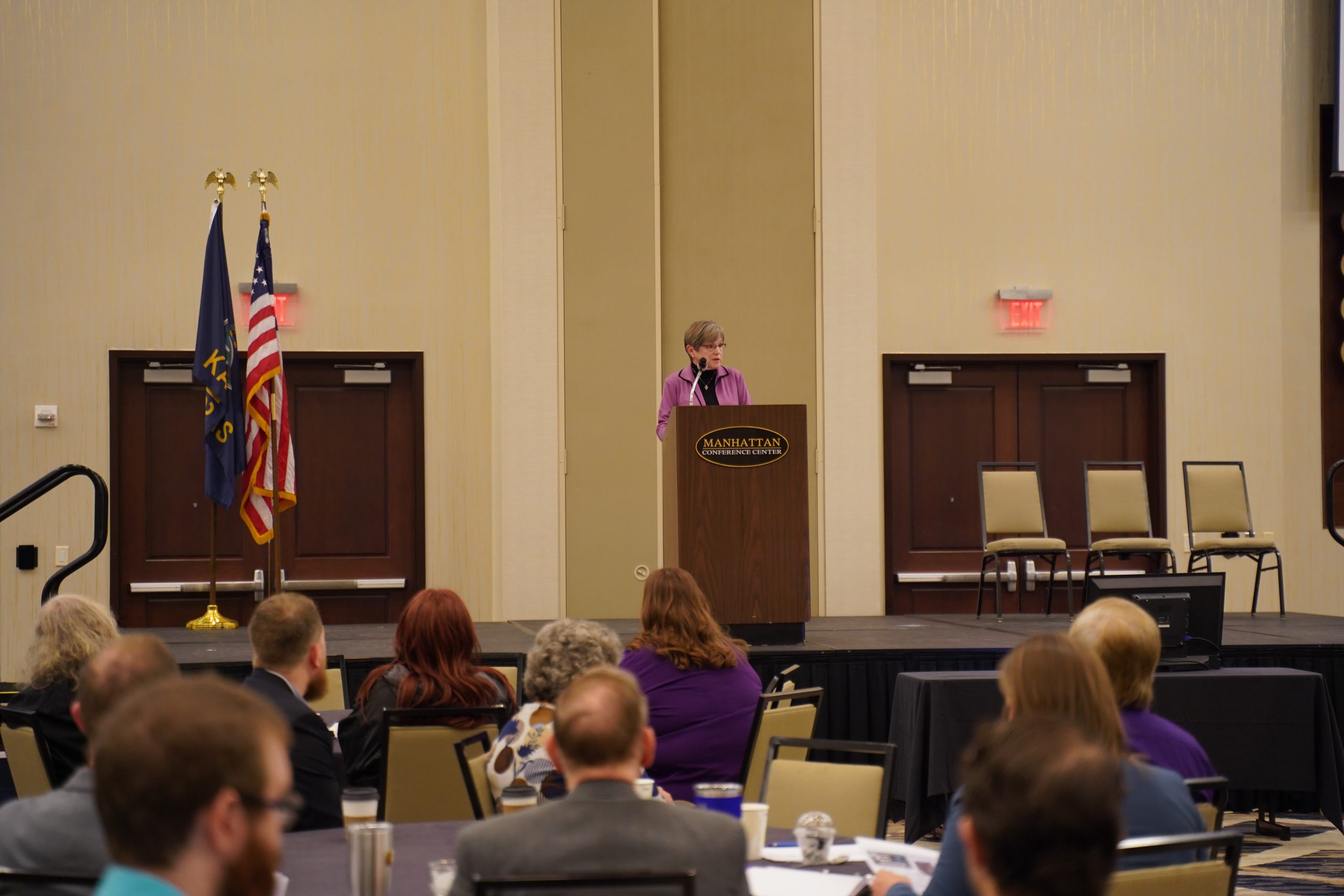Last year Kansas Gov. Laura Kelly told attendees of the recent Governor’s Conference on the Future of Water that protecting the state’s water supply would be a top priority in her second term, and for too long, politicians had been “all talk and no action” when it came to water.
This year’s conference was held in Manhattan, and Kelly’s no stranger to the issues surrounding water in the state—the depletion of the Ogallala Aquifer, proper water quality maintenance, keeping reservoirs at peak capacity and improving water vulnerabilities during times of drought and flash floods.
Kelly said there’s been important progress in addressing the water crisis in Kansas. One of the solutions was hiring a senior advisor on water for her office. Vijay Ramasamy works across agencies and partners at the state and local level with everyone from those in the agricultural industry to municipalities and beyond to develop well thought out solutions.
“Last week, I announced the creation of a Water Subcabinet to build a collaborative, all-of-government approach to water issues and programs,” she said. “The subcabinet will include representatives from the Kansas Water Office and the Kansas Departments of Agriculture, Commerce, Health and Environment, and Wildlife and Parks.”
Two landmark bills were passed during the last legislative session, HB 2279 and HB2302. HB 2279 partnered with Groundwater Management Districts on what she called an accountable and transparent path forward to manage the state’s water resources.
HB 2302 allocated an unprecedented investment in the State Water Plan, to the tune of $35 million annually for the next five years.
Kelly also said that in October, U.S. Sen. Jerry Moran, R-KS, worked with her to reach an agreement with the Kansas Department of Agriculture and the federal Fish and Wildlife Service concerning the water rights issues around the Rattlesnake Creek Basin.
“The impairment in Rattlesnake Creek has been an issue for decades and, much like our broader water problems, addressing it was not a question of if but how,” she said. “We needed to ensure an accountable and sustainable solution, one that secured the Fish and Wildlife Service’s senior water rights without simply cutting off water to hundreds of residents.”
This agreement will help give local stakeholders time to find a solution, while still keeping in place a call for water if an adequate plan isn’t submitted.
“I know not everyone was a big fan of the decision, but we must move forward with both accountability and partnership,” Kelly said. “I’m grateful to the Fish and Wildlife Service for their willingness to come up with a compromise that provides a responsible path forward.”
While encouraging progress is nice to have, she still believes there’s more work to do. There will have to be compromises to get the job done between the different stakeholders who have differing and sometimes opposing wants, needs and objectives.
“It is crucial that we build on our existing progress and empower even more stakeholders to take action,” Kelly said. “The good news is that we are in a better position than ever before to do that.”
The state is in a position to do the work needed because of a couple things. First, there’s funding available.
“For two years running now, we have fully funded the State Water Plan for the first time since 2008,” she said. “One of my key priorities is to take advantage of the millions of dollars in federal funding available through infrastructure packages to help improve water quality and drought resilience, and invest those funds in a smart, targeted way that aligns with a long-term strategic plan.”
Next is technology. Kansas State University is cranking out some of the best data in the country when it comes to water quality and quantity. Currently there are 75 faculty members working on water related issues and the just announced Kansas Water Institute.
“This institute will leverage resources and expertise from across the school and beyond to develop innovative solutions to water challenges,” she said.
There’s also momentum. Partially from the Kansas Water Authority voting to reject planned depletion of the Ogallala Aquifer and forging a new path when it comes to collective water conservation.
Kelly wants to dispel the myth that there has to be a choice made between conserving water and growing the economy.
According to Kelly’s remarks, the Local Enhanced Management Area in Sheridan County has shown a nearly 30% reduction in water use, all while producers saved and met their production goals.
Kelly’s also determined to increase public-private partnerships to remove some of the barriers around water conservation efforts. For example, in the Cheney Lake Watershed, the state and General Mills are working to help five Kansas Counties reduce water use and nutrient runoff—while increasing yields.
While these kinds of issues take time and may not be solved during Kelly’s next three years, she does hope best practices on a regional level can get the changes made.
Kelly hopes to intentionally bring a large variety of stakeholders together to provide feedback on a path forward. Stakeholders like agricultural, municipal water providers, cities, businesses and industrial water users.
“Water is an issue that impacts everyone, and we need everyone pulling in the same direction to get this done,” she said.
In doing so, Kansas has a tremendous opportunity to become a model for the rest of the country in water conservation.
“We can show that collective, coordinated action on water conservation and quality is good for our pocketbooks and our communities, in both the short term and the long term” Kelly said. “Opportunities like this don’t come along very often, so we owe it to ourselves, our children, and every future generation in Kansas to act now, before it’s too late.”
Kylene Scott can be reached at 620-227-1804 or kscott@hpj.com.




